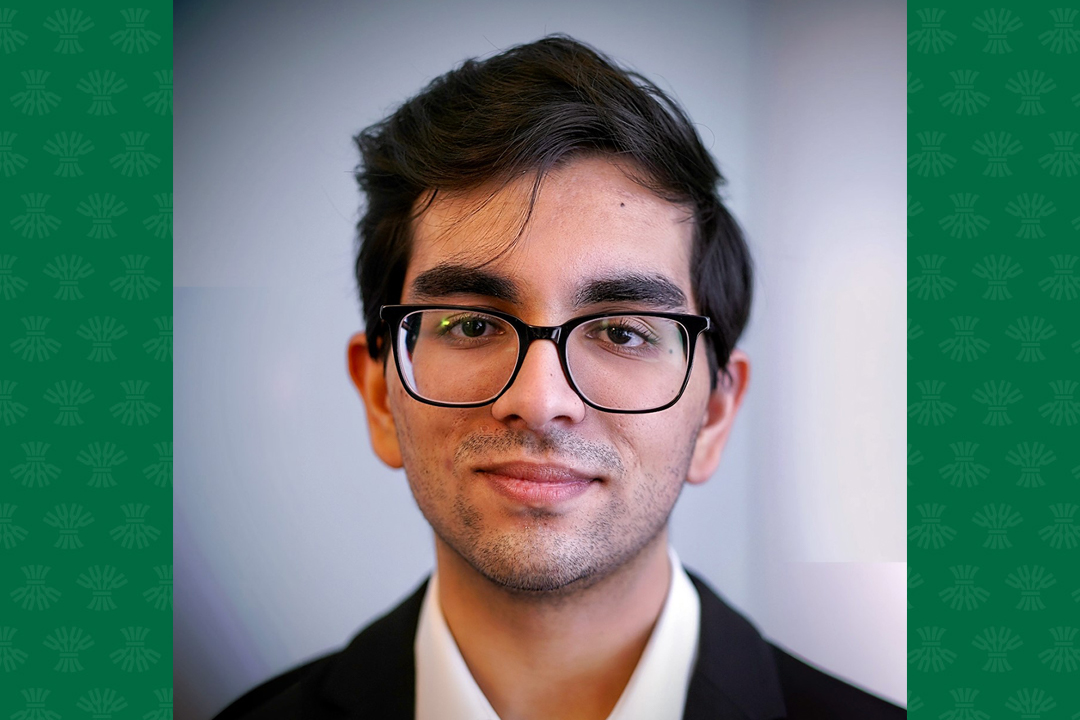
Ready to Launch: Anurag Sakharkar Pinpoints Key Biomarkers in Astronaut Health
Like a lot of kids, Anurag (Anu) Sakharkar used to dream about being a doctor, or an astronaut. His parents, both academics, encouraged him to follow his dream.
By RESEARCHERS UNDER THE SCOPE, Office of the Vice-Dean ResearchListen to all episodes of the Researchers Under the Scope podcast.
Researchers Under the Scope is produced by the Office of the Vice-Dean Research in the College of Medicine.
In high school, he began spending evenings and weekends working at the University of Saskatchewan’s (USask) biomedical labs, perfecting advanced research methods, western blots and PCR analysis. He began learning about Parkinson’s disease with Dr. Changiz Taghibiglou (PhD), then started examining novel cancer treatment approaches with Dr. Franco Vizeacoumar (PhD).
Anu was fascinated by the way genes expressed themselves, and the way they coordinated their activity in healthy people, while missing the same steps in patients with cancer.
The COVID-19 pandemic brought Anu’s in-person laboratory time to an abrupt halt. Undeterred, he began to spend his nights poring over gene expression data, using computational analysis to identify patterns.
“We integrated all these different methods and looked at the genome coordination as a whole,” said Anu. “What important pathways are involved, and how do they connect and interact at the DNA, protein, and RNA levels?”
His curiosity spread from analyzing biomarkers in cancer cells — to learning more about the dramatic changes occurring in an astronaut’s body during space flight.
"I had just watched the launch of one of SpaceX's newest rockets and I think that probably just sparked it in my mind, that astronauts have a ton of health issues,” he said.
Anu realized the processing techniques he’d learned for genome correlation could apply not only to patients with cancer — but also to astronauts suffering after being exposed to microgravity and cosmic radiation, alongside other stressors in space.
Astronauts lose bone density and muscle mass in space. They endure neurological degeneration, renal and cardiovascular dysfunction, compromised immunity, and upon their return to earth they have a far higher risk of developing cancer. Anu noticed a more large-scale inherent change in these astronauts in his research.
“You see gene correlation and coordination breaking down all over the entire genome,” said Anu. “You have a huge systemic trauma that's occurring in these astronauts when they go into space.”
Together with Dr. Jian Yang (PhD) from the College of Pharmacy and Nutrition, Anu started analyzing astronaut gene expression data gathered in NASA’s open-source GeneLab. It tracked eight men and two women posted to the International Space Station for a six-month period, including pre-flight, inflight, and post-flight measurements.
Anu developed a novel expression analysis method, and has now identified 32 genes with outsized effects on astronauts’ health as possible candidates for biomarkers to characterize, monitor, and even treat health issues.
In February, his research was published in Life. With support from the USask President’s NSERC Research Fund, it also formed a partial basis of Anu’s honours thesis as he completes his final undergraduate year this spring, majoring in cellular physiology and pharmacology.
Although astronauts today rely strictly on physical therapy to mitigate the effects of space travel, Anu believes pharmaceutical treatments will one day be part of space flight.
“Astronauts have to literally strap themselves onto a treadmill because otherwise they would just float off, and exercise for multiple hours every single day, which is completely unsustainable long-term,” Anu said. “There's no genetic medicine being done on astronauts right now, at least not publicly."
Anu plans to continue studying in a field related to space biosciences. He’s also developed partnerships with universities around the world, along with NASA, the Canadian Space Agency, and private space bioscience companies.
“I do have a couple of career opportunities lined up that I’m really, really excited about. And hopefully, we can actually continue working with our collaborators to send experiments up into space and actually look at gene expression and see if these genes are actually viable biomarkers,” he said.
“Space is definitely humanity’s future,” Anu said. “That future is getting closer and closer.”
